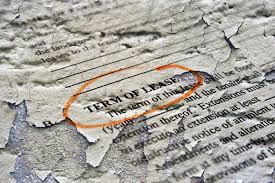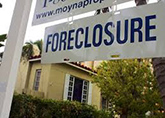SMALL BUSINESS FOCUS: Constructive Eviction in Commercial Leases
 Most residential renters know that in the District of Columbia (DC) they have a warranty of habitability and right to quiet enjoyment of their homes implied by law in every residential lease. These rights allow them to stop paying rent and vacate the property when the landlord’s failure to make repairs renders their home uninhabitable. If the landlord sues them for rent payments, the tenant can assert a “constructive eviction” defense to avoid paying the rent and in some cases, even ask for money damages, if, for example, there is damage to personal property.
Most residential renters know that in the District of Columbia (DC) they have a warranty of habitability and right to quiet enjoyment of their homes implied by law in every residential lease. These rights allow them to stop paying rent and vacate the property when the landlord’s failure to make repairs renders their home uninhabitable. If the landlord sues them for rent payments, the tenant can assert a “constructive eviction” defense to avoid paying the rent and in some cases, even ask for money damages, if, for example, there is damage to personal property.
The right to quiet enjoyment of the premise is inherent in every residential lease and cannot be waived away. Not so in commercial leases. A commercial tenant can willingly or inadvertently waive a right to quiet enjoyment. Commercial tenants are treated differently because the law considers the landlord and tenant to be sophisticated parties who are capable of bargaining on equal terms.
As the peoples’ lawyer, Living With The Law contends that small business people are as much at the mercy of DC’s big commercial interests as are residential renters. We want to help small businesses understand their rights and will present a series of articles focusing on commercial leases. Constructive eviction in commercial leases is the first article in this series. A more detailed legal discussion of the case law on constructive is available in our Subscriber Section.
What is constructive eviction?
In an actual eviction, the landlord sues in Landlord & Tenant court to regain possession of the premises for unpaid rental payments. Like residential leases, self-help eviction by a commercial landlord is prohibited by DC law. Constructive eviction is not a physical removal of the tenant by the landlord from the premises, but springs from the tenant’s action to withhold rental payments and fully or partially leave the property. Once the landlord sues for unpaid and future rent payments due through the end of the lease term, the tenant can then claim constructive eviction as a defense against the landlord to relieve them of the obligation to pay rent. To win on a constructive eviction defense, the following elements must be present:
- The landlord’s actions or failure to act breaches a duty owed the tenant under the lease.
- The landlord’s actions or inactions cause the premise to be unusable for the purpose it was rented.
- The tenant must vacate the property within a reasonable time.
- The landlord must have actual notice of the problems and a reasonable time to cure the conditions.
Recent cases in the District of Columbia indicate that the DC Courts will look to the four corners of the lease to determine whether the tenant abandoned the premise as a result of the landlord’s actions or inactions which substantially interfered with, or permanently deprived the tenant from using the leased premises for its intended purpose. DC Court rulings have relied on both an express and implied warranty of quiet enjoyment in a commercial lease to find grounds for constructive eviction when the landlord’s actions are serious and persistent to the point of making all or part of the premises uninhabitable for its intended purpose. The problem must present more than isolated incidents.
The law of implied warranties in commercial leases is still developing and it is uncertain if a court will uniformly base its ruling on an implied warranty of quiet enjoyment when the lease fails to expressly state it. A commercial tenant should make sure that the lease contains a Quiet Enjoyment covenant. Some examples of landlord breach that courts have found sufficient to violate the warranty of suitability include:
- Failure to furnish adequate heat or air conditioning.
- Structural defects in demised premises such as persistent leakage of water through the roof, ceiling, or walls.
- Serious defects in the sewer or drainage.
- Actions that deny tenant and customers access to the premises.
The “reasonable time” within which the tenant must abandon the premise varies on a case-by-case basis. A court will look to the specific factual circumstances. However, remaining in the property without paying rent may waive the defense of constructive eviction. For example, in one case, the DC Court of Appeals found that a tenant couldn’t claim constructive eviction having remained in the premise one year after the conditions he complained about.
Similar to residential leases, the commercial tenant must show that the landlord was notified of the problem and given reasonable time to fix them. Most leases will establish the amount of time to fix problems that are the landlord’s duty. If the landlord already has actual knowledge of the problem, notice will not be necessary.
When problems crop up in commercial leases, withholding rents and vacating the premise often puts the tenant in the position of defending their actions in court. Although, constructive eviction is well established in DC courts as a defense in commercial leases, it is often difficult to sway courts successfully on the elements essential to prove the tenant’s case. A small businessperson usually ends up signing the form lease presented by the landlord and rarely has the same bargaining strength as the landlord. Prevention is the best protection and a small businessperson would be better served by having their lease reviewed by an attorney before signing it.
NEXT UP IN THIS SERIES: IS A LANDLORD LIABLE FOR THIRD PARTY ACTIONS?
The discussion of legal issues in this column is for informational purposes only, and not specific legal advice. If you need assistance with your commercial lease or an eviction lawsuit, please contact an Attorney. In the Subscriber’s Only Section of this Web Page is an Article on Constructive Eviction that centers more on the Legal aspects of the issue.






